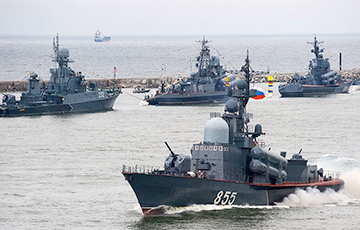Russia Evacuates Part Of Baltic Fleet
43- 23.10.2023, 14:42
- 37,594

The decision was taken against the background of NATO's build-up in the Baltic.
In response to NATO's expansion in the Baltics, Russia will send part of the Baltic Fleet to Lake Ladoga, a source in the Russian Defence Ministry told «Izvestiya».
The source said that it was a question of transferring the small missile ships of the 22800 Karakurt and 21631 Buyan-M projects to the waters of the lake.
The final decision on their permanent deployment on Lake Ladoga has not yet been taken, but the military has been studying hydrographic information and analysing possible threats from the enemy. The ships have also already checked routes and carried out manoeuvres on the lake, the interlocutor noted.
"This is a quite reasonable military-technical response to Finland and Sweden joining NATO," said military historian Dmitry Boltenkov. He recalled that the Ladoga flotilla was stationed on Lake Ladoga during the Second World War. Moreover, he said, the area was not so well known to NATO intelligence.
"Karakurts are effective platforms for deploying various types of weapons, in the future they can be equipped with hypersonic Zirkon missiles," Boltenkov noted, adding that it is a "good idea" to ensure firing at NATO targets with the help of Karakurts and Buyanovs.
"Lake Ladoga is deeper than the Baltic Sea. At the same time, the armament of small missile ships has a significant range," says military expert Captain 1st Rank Vasily Dandykin. The distance from the lake to the Finnish border is 40 kilometres. The range of the Kalibr cruise missiles with which the Karakurts are armed is over 1,500 kilometres. At the same time, the Russian ships will be covered by the navies of the NATO countries based in the Baltic Sea in Lake Ladoga.
However, as the commander of the Sovetsk MRK pointed out, the Karakurts are not designed for river navigation and will have to be brought to Lake Ladoga by tugboats on the Neva River. Moreover, Lake Ladoga is a freshwater lake, and it remains to be seen how the ships will perform in the long term in fresh water.
With Finland's and Sweden's expected accession to NATO, the military alliance will have full control over the Baltic Sea. "With five submarines we can close the Baltic Sea. We close the areas of interest with our radars and weapons," said Frederik Linden, commander of Sweden's First Submarine Flotilla.
The accession of Finland and Sweden to NATO would significantly change the balance of power in the Baltic, said IISS Senior Fellow Nick Childs. "Russia's Baltic Fleet will find it very difficult to operate freely. Although it could still pose a threat to NATO," he concluded.










